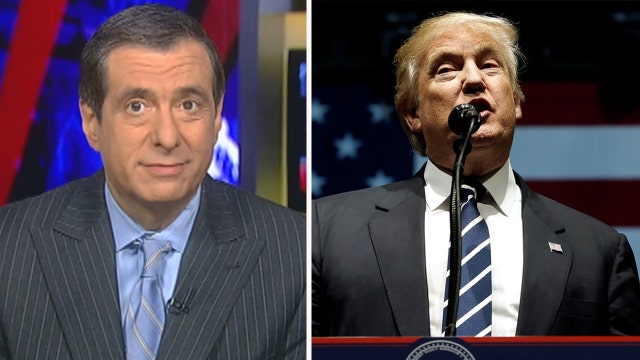Kurtz: Media uproar over Trump and Exxon’s CEO
'MediaBuzz' host Howard Kurtz weighs in on the biased and negative coverage from the media surrounding Trump's cabinet picks
Five weeks after the election, a war has broken out over Donald Trump’s foreign policy.
The media troops are charging hard, saying the president-elect is dissing the CIA and likely to turn over the State Department to a friend of Vladimir Putin and an overly hawkish deputy.
For all the controversy that Trump has generated since winning the election, this is the biggest storm, generated by a press corps that remains suspicious of the country's new leader.
Trump was indeed dismissive of the CIA findings, leaked to the Washington Post, that the Russian government used hackers to try to help him win the presidency. “Ridiculous,” he told Chris Wallace, and an “excuse” by the Democrats for losing. He also put out a statement saying this is the same bunch that brought us Saddam’s WMDs. (Now under different management than in the Bush years, of course.)
Now Trump may have gone a step too far in alienating the intelligence agencies he’ll have to rely on as president. But he does have a point that the findings are less than rock-solid, as is often the case in the murky world of spycraft.
The New York Times yesterday acknowledged that Langley had no new information, just “what many believe is overwhelming circumstantial evidence”:
“American spy and law enforcement agencies were united in the belief, in the weeks before the presidential election, that the Russian government had deployed computer hackers to sow chaos during the campaign. But they had conflicting views about the specific goals of the subterfuge.” And the FBI has a more ambiguous view.
Still, the media are demanding investigations. Look at the tone of this Washington Post headline:
“Key GOP senators join call for bipartisan Russia election probe, even as their leaders remain mum.”
The implication is that Republicans who don’t side with John McCain and Lindsey Graham in supporting a probe are just partisan hacks. In any event, Mitch McConnell and Paul Ryan made clear yesterday that there will be an investigation.
Liberal NYT columnist Paul Krugman yesterday declared this a "tainted" election and "illegitimate in important ways," including the hacking, Hillary's popular-vote win and James Comey's late intervention.
It’s worth pointing out that this whole episode is marked by hypocrisy. If Hillary Clinton had won the election and the CIA said Russian hackers had tried to help her, the Republicans would be apoplectic and the Democrats would be playing it down.
“Imagine if the election results were the opposite and WE tried to play the Russia/CIA card. It would be called conspiracy theory!” Trump tweeted yesterday.
Which brings us to Rex Tillerson, the Exxon-Mobil CEO, who has known Putin for two decades -- and whom Trump announced as his choice for secretary of State on Tuesday.
It’s certainly fair for the press to question whether a corporate chieftain with zero political experience is suited to be the nation’s top diplomat. And Tillerson’s friendly relations with Russia, which gave him an Order of Friendship award, has fueled concern about the president-elect’s approach, especially in the McCain-Graham wing of the GOP.
According to the Times, which painted him as something of a hothead, his unconventional approach “could open up Mr. Tillerson to closer scrutiny in Senate confirmation hearings, particularly when it comes to his close relations with Russia.”
Meanwhile, there is also sniping over reports that Trump may name as Tillerson’s deputy John Bolton, the Fox News contributor and former U.S. ambassador to the U.N.
MSNBC’s Joe Scarborough called the potential pick “madness,” saying, “Why would Donald Trump pick a guy who still thinks invading Iraq was a good idea?” (So did Hillary Clinton and many others at the time.)
What really set off Bolton’s critics was what he said on Fox over the weekend about the CIA’s findings on Russian hackers: “It’s not at all clear to me just viewing this from the outside that this hacking into the DNC and the RNC computers was not a false flag operation”—perhaps making the “extraordinary suggestion” (as the Post put it) that the Obama administration was stirring things up.
A spokesman for Bolton emailed last night to say that "assumption" was "false" and that the ex-ambassador "made it unambiguously clear that 'false flag' is a reference to foreign entities such as China, North Korea, Iran, etc."
Just for good measure, Politico kicks around a former Fox contributor, K.T. McFarland, without an on-the-record source criticizing her selection as deputy national security adviser—and even implying she’s too old for the job. McFarland, 65, worked for the Pentagon during the Reagan administration.
“Many of those who are skeptical of the McFarland appointment,” Politico says, speaking “under condition of anonymity…insist she is a policy lightweight with no real personnel or crisis management experience. Several said her job would test the stamina even of someone a decade younger.”
Politico does include some on-the-record praise for McFarland, an Oxford graduate, with Ed Rollins calling her “extraordinarily smart.”
All in all, the attacks involving the CIA, Tillerson, Bolton and McFarland, along with the Taiwan call, feel like an assault on how Trump is approaching foreign policy. Maybe that’s why he’s pushing back so hard.





